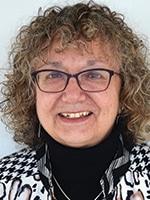Nearly 700 people donated blood at the fall 2021 AACC meeting for the COVID-19 immunology sample bank, for two reasons: to gather COVID-related information on members and to provide blood to those who needed it for related research, “as a way to support the scientific community,” Dr. Zhang says.
Two surveys were distributed before the meeting—one on general health and one COVID specific (about vaccinations, side effects, infections). Follow-up surveys are being done about booster shots, infections, and symptoms.
The overall goal was to study a diverse population from within the AACC community to evaluate the antibody profiles of those who received different vaccines at various times. “We carefully selected different assays to evaluate anti-N and anti-S antibodies,” Dr. Zhang says, adding that they studied neutralized antibodies and T-cell immunity in the same population.
“First, we want to gain insights from the survey data into the distribution of vaccine types, side effects, and symptoms from infection among laboratory professionals,” she says. With almost 1,000 completed questionnaires (277 members completed questionnaires but were unable to donate blood on site), “we are able to assess these impacts from different age, gender, race, and ethnic groups.”
Second is the analysis that can be done from the test results of nearly 700 people. “We have the time stamp for the different vaccines, so we are hoping to see the neutralized antibody and the T-cell immunity changes over time within this group,” Dr. Zhang says. She acknowledges the support for the study from industry in terms of tubes, reagents, and other supplies. The study’s main findings will be reported at the meeting.
Filling the pipeline is the focus of a session on the staffing crisis, to be presented by Eden Scherer, BS, MT(ASCP), and Judith Sterry, MS, MT(ASCP) (with Kathleen David, MT(ASCP), of TriCore Reference Laboratory). Scherer is manager of laboratory services at Spectrum Health Lakeland in Niles and Watervliet, Mich., which has teamed up with Lake Michigan College in Benton Harbor and with the Michigan Works Association to create a phlebotomy certificate program. Michigan Works is developing the federal and state financial support, the college is providing the classroom education, and Spectrum Health Lakeland is providing the hands-on, real-life experience, which includes an internship and externship.“The burnout and turnover are high,” Scherer says of phlebotomists. “We’re constantly working short-staffed.”
After a screening process through the college and Michigan Works, candidates who meet the prerequisites can apply for the program. Further screening of the applicants is followed by several applicant interviews, after which selections are made. “Then they join our phlebotomists in our outpatient areas to learn the preanalytical process.” The course is about one year, and when students complete it, they are guaranteed the required externship hours (an extension of the internship hours). “Then they’re qualified to sit for a phlebotomy certification test, and then we try to hire them,” Scherer says.
With the college promoting this certificate program, “people who might not have any idea about the laboratory being a career are learning about it,” Scherer says. “It’s not an associate’s degree, but it would be a skilled job for them to do while they’re still pursuing other studies. And maybe those further studies will be in clinical laboratory science.”
Spectrum Health Lakeland has hosted many phlebotomists for post-education student rotations from a variety of schools, but the first cohort of apprentices from the joint education program is set to complete the program by the end of this summer.

Sterry
The University of Rochester Medical Center, where Sterry is director of strategic development, has created two paths for training laboratory staff. The first is part of a laboratory division that performs clinical trial specimen processing and testing. “This testing is non-diagnostic, so we are able to hire and train staff with various scientific degrees,” Sterry says. “Staff learn complex processing techniques along with complex molecular analytical techniques. These staff members are then ideal candidates for a year-long, on-the-job trainee program in molecular diagnostics or cytogenetics.” Successful completion of the on-the-job program provides the opportunity to become a licensed technologist in New York State under a restricted pathway, she says, with limited practice to either one of those two areas.
The second pathway was forged through URMC’s development of a NAACLS-accredited, full-time, post-baccalaureate clinical/medical technology advanced certificate program. The program is open to those who have degrees in the sciences—biology, chemistry, biochemistry, etc.—but are not qualified to sit for the national MLS board exam.
“This full-time program is a combination of 200 didactic lectures integrated with 720 hours of clinical experiences. Upon completion, which takes about a year, graduates are qualified to apply to ASCP to take the MLS board exam, which NYS has also adopted as the state licensing exam,” Sterry says. She credits the department’s education manager, along with faculty and licensed clinical technologists (“experts in their fields,” she says), for starting the program about six years ago “from the ground up, from nothing.”
All of the more than a dozen slots are filled each program year, and URMC recruits more than 80 percent of its graduates.
“It’s clear that we all need to use our life experiences to be creative and help develop sustainable career pathways for the clinical laboratory scientists of the future, be they from traditional medical technology or nontraditional pure science programs,” Sterry says.
Valerie Neff Newitt is a writer in Audubon, Pa.
 CAP TODAY Pathology/Laboratory Medicine/Laboratory Management
CAP TODAY Pathology/Laboratory Medicine/Laboratory Management
